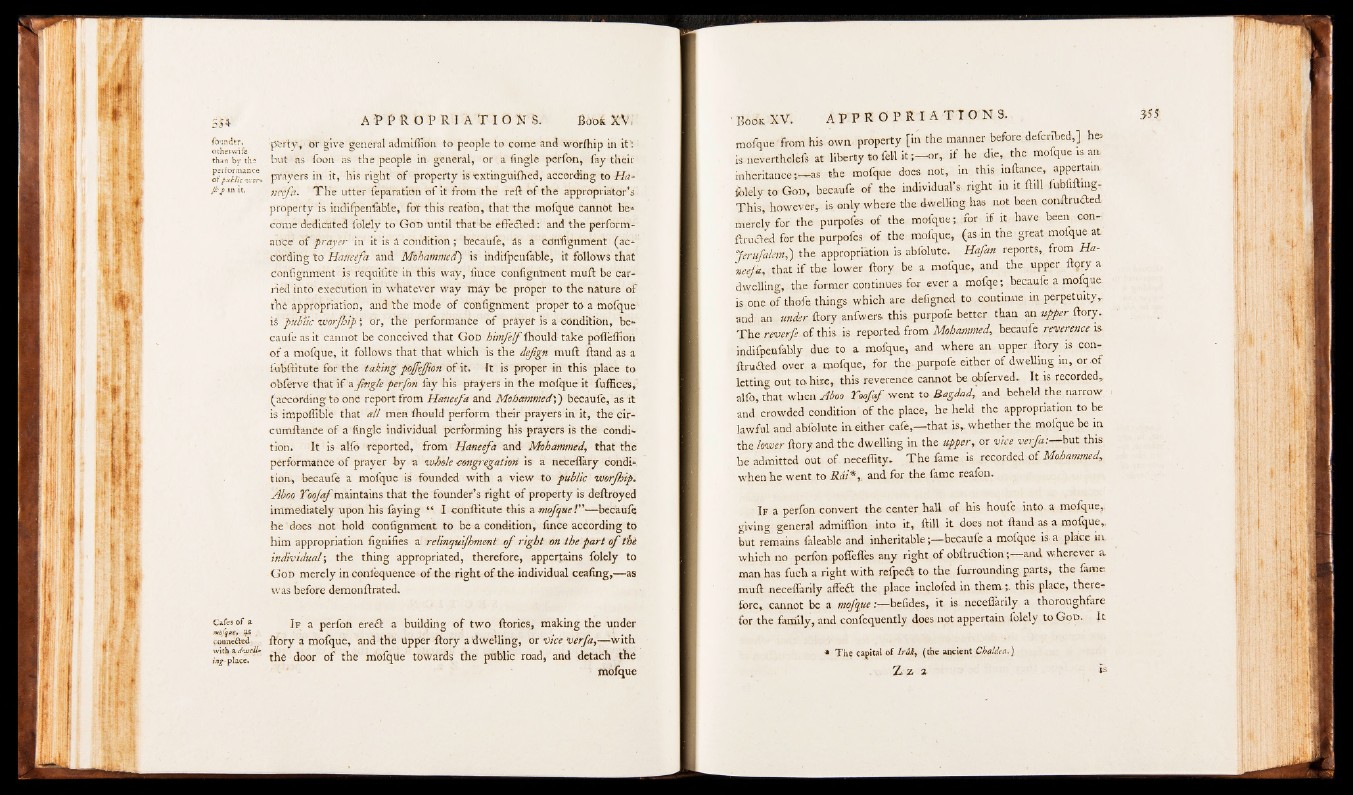
5$^ ap propri at ions . Rooi XV,
founder,
ocher wife
than by the
performance
of public ivor*
Jk'M in it.
Cafes o f a
mo'que, as
connected
with a d-jjelU
«replace.
perty, ör give general admiffion to people to come and worffiip in it':
but as foon as the people in general, or a Angle perfon, lay thèif
prayers in it, his right of property is ■ extinguiftied, according to Ha-
neefa. The utter feparation of it from the reft of the appropriator’s .
property is indifpenfable, for this realon, that the mofque cannót be*
come dedicated folely to G od until that be effected: and the performance
of prayer in it is a condition; becaufe, as a COrffignment (according
to Haneèfu and Mohammed) is indifpenfable, it follows that
confignment is requiiitè in this way, fince conlignment mult be carried
into execution in whatever way tnay be proper to the nature of
the appropriation, and the mode of conlignment proper to a mofque
is public Worjhip-, Or, the performance óf prayer is a Condition, be*
caufe as it cannot be conceived that G od himfelf lhould take poflèffion
of a mofque, it follows that that which is the dejign mult ftand as a
iubftitute for the taking pojfcffton of it, ft is proper in this place to
obferve that if aJingle perfon fay his prayers in the mofque it fuffices,
(according to one report from Haneefa and Mohammed',) becaufe, as it
is impoffible that all men fhould perform their prayers in it, the cir-
cumftanCe of a Angle individual performing his prayers is the condition,
It is alfo reported, from Haneefa and Mohammed, that the
performance of prayer by a mhole congregation is a neceflary condition,
becaufe a mofque is founded with a view to public worjhip,
Ahoo Yoofaf maintains that the founder’s right of property is deftroyed
immediately upon his faying “ I conftitute this a mofque!” — becaufe
he does not hold conlignment to be a condition, fince according to
him appropriation fignifies a relinquijhment o f right on the part o f the
individual; the thing appropriated, therefore, appertains folely to
G od merely in conlequence of the right of the individual ceafing,— as
was before demonftrated.
If a perfon eredl a building of two ftories, making the under
ftory a mofque, and the Upper ftory a dwelling, or vice verft,— with
the door of the mofque towards the public road, and detach the
mofque
mofque from his own property [in the manner before deferred,] he>
is neverthelefs at liberty to fell i t ; - o r „ if he die, the mofque is an
inheritance;— as the mofque does not, in this inftance, appertain
folely to God, becaufe of the individual’s- right in it ftill fubfiftmg-
This, however,. is: only where the dwelling has not been conftru&ed
merely for the purpofes of the mofque ; .for if it have been con-
ftructed for the purpofes of the mofque, (as in the great mofque at
Jerufalem,) the appropriation is abfolute. Hafan reports, from Ha-
neefa, that if the lower ftory be a mofque, and the upper ft§ry a
dwelling, the former continues for ever a mofqe; becaufe a mofque
is one of thofe things which are defigned to continue in perpetuity ,
and an under itory anfwers this, purpofo better than an upper ftory.
T h e reverfe of this is reported, from Mohammed, becaufe reverence s
indifpenfably due to a mofque, and where an upper ftory is con-
ftructed over a mofque, for the purpofe either of dwelling m, or,of
letting out to hire, this reverence cannot be obferved. It is recorded,
alfo, that when A boo Yoofaf went to Bagdad, and beheld the narrow
and’ crowded condition of the place, he held the appropriation to be
lawful and abfolute in. either cafe,— that is, whether the mofque be in
the lower ftory and the dwelling in the upper, or vice verfa:— but this
he admitted out of neceffity. T h e feme is recorded of Mohammed,
when he went to R d i*, and for the feme reafon.
If a perfon convert the center haU of his houfe into, a inolquc,.
giving general admiffion into it, ftill it does not ftand as a mofque,,
but remains feleable and inheritable;— becaufe a mol'que is a place in
which no perfon poffefies any right of obftrudtion;— and wherever a
man has fuch a right with refpeft to the furrounding parts, the feme
tnuft neceffarily affedt the place inclofed in them;. this place, therefore,
cannot be a mofque:— belides, it is neceflarily a thoroughfare
for the family, and confequently does not appertain folely to G od, It
* T h e capital o f Irak , (the ancient Chaldea.)
Z Z 2 »